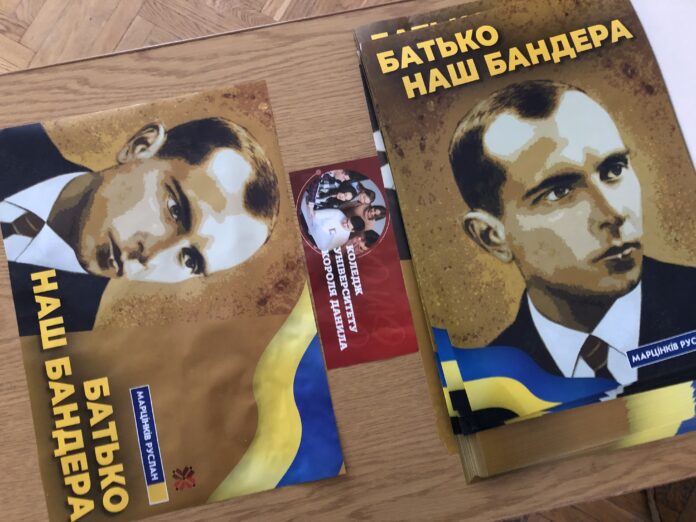When the air raid sirens stopped at 1 p.m. on Friday, workers climbed out of the basement of the Ivano-Frankivsk government building and returned to their desks.
Six hours earlier, missiles struck the west Ukraine city’s airport for the second time in two weeks, prompting the mayor to accuse Russian forces of trying to stoke fear in the heart of Ukrainian nationalism.
“Russia wants to make people panic,” Ruslan Martsinkiv said, after resuming work at his office, where a portrait of the complicated Second World War Ukraine independence hero Stepan Bandera hung from his wall.
Russia widened its assault on Ukraine on Friday morning, striking two airports in the west of the country. Three missiles hit a military airfield in Lutsk, killing two Ukrainian soldiers, the local mayor said on Facebook.
No deaths were reported in Ivano-Frankivsk but two were injured. The city’s air raid system failed to sound during the attack, Martsinkiv said, but it was triggered hours later, and residents hid in shelters.
“The city is prepared, but war is war,” the mayor said.
Ivano-Frankivsk is an industrial city of almost 300,000 just a few hours from Poland, Slovakia, Hungary, Romania and Moldova.
The region is also the birthplace of Bandera, a divisive national icon who fought for Ukrainian independence but whose temporary alliance with Nazi Germany remains a fixation of President Vladimir Putin.
Putin’s claim that his invasion was intended to “de-Nazify” the country was no doubt an attempt to tap Russian memories of Bandera, whose militia collaborated with Germany until it refused to recognize an independent Ukraine.
But to many Ukrainians, he represents the ongoing struggle for nationhood, and six decades after the KGB assassinated him with cyanide, he was inescapable around Ivano-Frankivsk as the city girded for the possible arrival of Russian forces.
An air raid siren on Friday sent residents of Ivano-Frankivsk into bunkers, Ukraine, March 11, 2022.
Stewart Bell/Global News
The red and black flags of the Ukrainian Insurgent Army, the militant wing of Bandera’s Organization of Ukrainian Nationalists, flew on the streets alongside Ukrainian flags.
Posters bearing his image were stacked on a table outside the mayor’s office, and his portrait looked over the mayor’s desk. “Bandera for us is a hero,” Martsinkiv explained.
The square outside the administrative building had the look of a fortress. The windows were draped in black plastic. Metal tank barriers and sand bag bunkers guarded the front. Soldiers patrolled the property.
No photography was permitted.
Igor Lukynik, organizing supplies for the frontlines, in Ivano-Frankivsk, Ukraine, March 11, 2022.
Stewart Bell/Global News
Igor Lukynik wore a sidearm as he stood outside the entrance of his headquarters, which was in the same building as the mayor’s office and ships food and supplies to soldiers and civilians on the front lines.
Trending Stories
Russian convoy outside Kyiv has redeployed into firing positions, satellite photos show
Grimes accidentally reveals birth of 2nd child with Elon Musk
Lukynik was an energetic man in a black toque who served in a volunteer battalion that fought Russian troops before he began organizing the collection and distribution of provisions.
His ringtone: “Bandera is my hero.” He flicked through the photos on his phone and showed a reporter a picture of a friend, whom he said died three days ago in Kyiv.
“Russians killed him,” Lukynik said.
The Ukrainian city of Ivano-Frankivsk during an air raid siren on Friday, March 11, 2022.
Stewart Bell/Global News
Although initially reluctant, he invited Global News into the cavern beneath the administrative building, where volunteers were readying donated goods for shipment to points east.
This was not a weapons depot. Rather, it was stocked with medical supplies, sleeping bags, shovels, camouflage netting, bottled water, bread, apples, sugar, salt, rice, tea, coffee, oil, honey, ketchup, spices and sausages.
The centre runs non-stop, Lukynik said, boxing donated goods and loading them into vehicles, which transport them to areas under Russian attack, as well as to troops manning forward positions.
“A starving soldier is not a soldier,” he said.
The morning airstrikes had not dampened Lukynik’s spirits. He said he lived near the airport and that he heard the missiles coming in. One landed 100 metres from his home, he said.
He said the city was targeted because of its airport and its role as a supply hub. “But we are not afraid of Putin,” he said, “and we will sing in Red Square that we are the sons of Bandera.”
Ruslan Martsinkiv, mayor of Ivano-Frankivsk, at his office hours after at air strike hit the city, March 11, 2022.
Stewart Bell/Global News
On the main floor of the government building, Canadian government logos branded banners describing a public transit project. The mayor said Canada had funded development in Ivano-Frankivsk.
A sign on a nearby glass door read: “mobilization hub.” Inside, volunteers were trying on donated body armour and helmets that were being amassed for the civil defence forces.
Martsinkiv said cities like his needed more government support to prepare for the intensifying Russian assault. In particular, Ivano-Frankivsk needed “weapons, helmets, body armour,” he said.
He said the city could use army medical kits as well.
The mayor warned that if Ukraine fell, Putin would keep going, into Europe.
But he said the Russian president’s attacks had united the nation, and that “all Ukraine is Bandera now.”
Russia-Ukraine conflict: U.S. has seen nothing to change its nuclear ‘deterrent posture,’ Kirby says
© 2022 Global News, a division of Corus Entertainment Inc.



